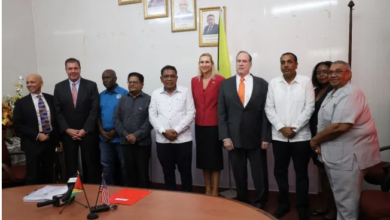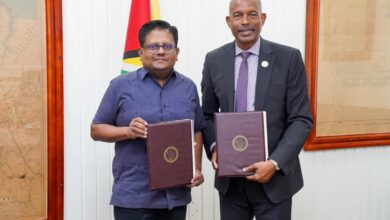(CARICOM Secretariat, Turkeyen, Greater Georgetown, Guyana) It is indeed a pleasure for me to address the opening of the 11th Caribbean Week of Agriculture, here in the beautiful country of Antigua and Barbuda whose government graciously consented to be the host for this week of activities. Since 1998, the CWA has become the signature event for the Region’s agriculture since it brings together a wide variety of stakeholders from the private sector, government, academia, and civil society, including youth and women, to examine the Caribbean’s most enduring sector.
Our theme this year is Celebrating Youth and Gender in Caribbean Agriculture “Each endeavouring, all achieving”. This emphasis on youth and gender is not new. At every Caribbean Week of Agriculture, we have sought to not only include but to highlight the role played by our youth and women in the sector’s development. In addition to national-level organizations and programmes that focus on these two important groups, we have two regional umbrella bodies, the Caribbean Agricultural Forum for Youth (CAFY) and the Caribbean Network of Rural Women Producers (CANROP), which have played significant roles in promoting the interests of their membership as they face the challenges of engaging in agricultural production.
The regional farmers’ organization, CaFAN, has also placed great emphasis on involving youth and women in their programmes. I applaud this effort of reaching out to the youth and women to become involved in the agriculture sector which provides them with an opportunity to earn a living as well as contribute significantly to the development of their country and the Region.
Ladies and Gentlemen, our Region is faced with an aging farmer population. Analysis has shown that within the next 10-15 years, the production of food within the Region will be seriously compromised if we are unable to attract young persons to the agriculture sector. The challenge is to make agriculture more attractive to them and convince them that such a career move is worth it.
To do so, we must provide improved access to training at all educational levels from primary to tertiary. We have to ensure that they have the access to resources, both financial and technical including access to technology. We have to ensure also that the market opportunities are available both for primary and value-added products, and finally we absolutely must change the image of agriculture and brand it as a sector filled with opportunity.
In all the Region’s policy and project initiatives, we have sought to highlight the role of youth and gender. For example, in the LILIENDAAL DECLARATION ON AGRICULTURE AND FOOD SECURITY issued by our Heads of Government in 2009, the Region committed itself to placing emphasis on bringing youth and women into the economic mainstream through their more active involvement in the agricultural sector. This commitment has been further elaborated upon in the Community Agricultural Policy (CAP) and the Regional Food and Nutrition Security Plan (RFNSP).
At an even more practical level, we have ensured that in the programmes that are being funded by our international partners, these important issues have been put front and centre. In the European Union-funded Intra-ACP Agricultural Policy Programme, which is about to be implemented, the major focus will be on small farmers, with a special focus on women and youth.
Ladies and Gentlemen, the soaring food prices are a continuing reminder that the Region has no choice but to pay increasing attention to food and nutrition security and cost-efficient sustainable production. Renewed emphasis must be placed on agriculture not only to counter food prices but also to ensure the Region’s populace eats what we produce. The involvement of women and young people is critical if we are to influence the taste and preference of our households to consume domestically produced nutritionally balanced foods which would also have the added benefit of safeguarding against chronic non-communicable diseases which are prevalent in the Region.
More of our governments are coming forward with concrete programmes aimed at increasing agricultural output. More recently, we heard of the initiative by the government of Trinidad and Tobago to launch a Food Security Facility, the aim being to utilize land available in Guyana to produce a range of food crops. This is a prime example of what can be done to collectively use the Region’s resources to engage in production integration and to increase the Region’s food supply. A regional approach to agriculture production is the obvious solution to addressing our high food import bill and our food and nutrition security.
While it is not feasible to produce all our food, it is crucial that we target those categories of food imports that can profitably be produced in the Region. A large segment of these imports go directly into tourism and the growing fast food sector. This is one area that we should be able to target but it requires that we arm ourselves with detailed information on the products involved, the form in which they are imported and the cost factors that have to be addressed.
There are some encouraging signs that we are making progress in penetrating the tourism and fast food industries, particularly in products like poultry. There is also scope to introduce more of our root crops into those sectors but to do that successfully, we have to develop the capacity to produce and package this product and provide them in exactly the form in which they are required. During this week, our Agriculture Ministers will have before them a draft plan of action for strengthening the linkages between agriculture and tourism. This, hopefully, will be the start of a more intensified regional approach to ensuring that the agricultural sector benefits to the maximum extent from the significant tourism expenditure that takes place every year.
The fact is that agriculture is a business much like any other. If it is profitable and dynamic it will attract new entrants. Our challenge then is to provide the supportive infrastructure and information that will assist those in the sector, and those wishing to enter, to operate on a profitable basis.
Ladies and Gentlemen, without a doubt we live in an information age, and experience over the last twenty years or so has demonstrated that small enterprises which take advantage of Information and Communications Technologies can punch way above their weight in the global economy. This makes it all the more important that all agriculture stakeholders in the value chain make greater use of ICT to enhance our competitiveness and efficiency. This is an issue that is on the agenda for discussion this week and I would like to throw out a challenge to those engaged in these discussions to come up with a measurable plan of action aimed at building up ICT capacity among our various agricultural organizations and producers.
The last issue I wish to address here relates to how the agricultural sector promotes itself. All too often, we spend much of our time lamenting our deficiencies and our failures and not enough time on assessing our successes and charting the way forward. Where there are examples of achievement, we should publicise them and hold them up as examples to the rest of the agricultural community, indeed, to our societies as a whole. I therefore want to encourage all our institutions to publicise on their websites and by any other means, at least once every quarter, an example of a successful agricultural endeavour within the Region and to make this a practice for the foreseeable future. Nothing breeds success like success!
In conclusion, let me take this opportunity to congratulate our Member States and the FAO on the celebration of World Food Day, especially the theme “Agricultural cooperatives – key to feeding the world” that is very relevant and linked to our theme for this year’s Caribbean Week of Agriculture. I must commend all the collaborating organizations –IICA, CARDI, FAO and CTA – and those in my own organization, the CARICOM Secretariat, the organizing committee here in Antigua who have worked tirelessly to make this a memorable event. Observing the fervour with which you have all worked, I can only conclude that the Region’s agricultural sector is in good hands and is poised to achieve great things in the future.





